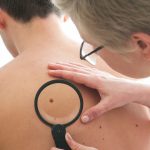 Two meta-analyses recently investigated the association between alcohol and two types of skin cancer. Both studies carefully conclude that each glass of alcohol could increase the risk of these specific types of skin cancer. It is still unknown whether alcohol causes this effect or that other confounding factors play a role. The underlying mechanism is also unknown. More research is therefore necessary before strong conclusions can be drawn. The results are published in the scientific journals British Journal of Dermatology1 and European Journal of Nutrition2.
Two meta-analyses recently investigated the association between alcohol and two types of skin cancer. Both studies carefully conclude that each glass of alcohol could increase the risk of these specific types of skin cancer. It is still unknown whether alcohol causes this effect or that other confounding factors play a role. The underlying mechanism is also unknown. More research is therefore necessary before strong conclusions can be drawn. The results are published in the scientific journals British Journal of Dermatology1 and European Journal of Nutrition2.
What is already known? Until now there has been insufficient evidence for an association between alcohol and skin cancer.
What do these studies add? Both meta-analyses look at a different type of skin cancer. The researchers judge whether there is significant evidence to conclude that alcohol consumption increases the risk of skin cancer. The underlying mechanism is not investigated. Confounding factors could influence the association.
About skin cancer
There are two types of skin cancer; melanoma and non-melanoma. Melanoma, the malignant type, accounts for 4-5% of all cancer cases in Western Europe3, and for 5-10% of all skin cancer cases4. According to estimates there are about 13 new cases of melanoma per 100,000 people per year in Europe. The overall lifetime risk of developing melanoma is 2.4% in Caucasians5.
For the less severe type, non-melanoma, basal cell carcinoma (BCC) accounts for about 80% of the cases, and cutaneous squamous cell carcinoma (cSCC) for 20% of the cases4,6. Numbers are however limited because of the lack of national registries. Estimates indicate that incidence of non-melanoma skin cancer is 18-20 times higher than that of melanoma5,6. Skin cancer in total would therefore be the most prevalent type of cancer in Europe6.
Risk factors skin cancer
Ultraviolet (UV) radiation, either from sunlight or artificial sources (e.g. sunbeds), is the main risk factor for non-melanoma skin cancer1,6. Also for melanoma, UV-radiation is the most important environmental risk factor. Other risk factors for skin cancer include light skin colour, red hair, and having many freckles1,2.
Meta-analysis on non-melanoma skin cancer
The researchers of this study1 looked at the two types of non-melanoma; BCC and cSCC. Nine studies were included for the meta-analysis including in total over 30,000 cases of BCC and over 3,000 cases of cSCC. The results of the dose-response analysis show that for each 10g of alcohol per day the risk of BCC increases with 7% and the risk of cSCC increases with 11% (see ‘results in context’). These analyses are based on 6 and 3 studies, respectively. Limited data was available for higher amounts of alcohol consumption. This could have influenced the dose-response relationship. Moreover, UV exposure and other unknown lifestyle factors could have influenced the association.
Meta-analysis on melanoma skin cancer
This meta-analysis2 included 20 observational studies, including over 1.6 million people of which over 10,000 had melanoma. About half of the studies adjusted for UV exposure and physical characteristics. The dose-response analysis shows that for each 10 g of alcohol per day the risk of melanoma increases with 7% (see ‘results in context’). All studies adjusted for age and gender. Other unknown factors could have influenced the association.
Results in context
Exposure to UV-radiation is by far the most important risk factor for developing skin cancer. However, specific data on the contribution of UV-radiation to the development of skin cancer are unavailable.
Increased risk by alcohol
The overall risk of developing melanoma in your lifetime is 2.4%5. An increased risk of 7% will lead to a risk of about 2.6%. So compared to the 2.4% baseline risk, a risk increase of 0.2 point.
Conclusion
Overall there are still too many unknown factor to draw firm conclusions about the association between alcohol consumption and the risk of skin cancer.
References
1. Yen, Dhana, A., Okhovat, J. – P., Qureshi, A., Keum, N., en Cho, E. Alcohol intake and risk of nonmelanoma skin cancer: a systematic review and dose-response meta-analysis. British Journal of Dermatology, vol. 177, nr. 3, pp. 696 – 707, 2017.
2. Gandini, Masala, G., Palli, D., Cavicchi, B., Saieva, C., Ermini, I., Baldini, F., Gnagnarella, P., en Caini, S. Alcohol, alcoholic beverages, and melanoma risk: a systematic literature review and dose-response meta-analysis.
3. International Agency for Research on Cancer (IARC). Global Cancer Observatory. GLOBOCAN 2012. Accessed on 21-03-2018.
4. Greinert, R., de Vries, E., Erdmann, F., Espina, C., Auvinen, A., Kesminiene, A., & Schüz, J. 2015.
5. Apalla Z, Lallas A, Sotiriou E, Lazaridou E, Ioannides D. Epidemiological trends in skin cancer. Dermatology Practical & Conceptual. 2017;7(2):1-6.
6. Leiter U., Eigentler T., Garbe C. (2014) Epidemiology of Skin Cancer. In: Sunlight, Vitamin D and Skin Cancer. Springer, New York, NY
